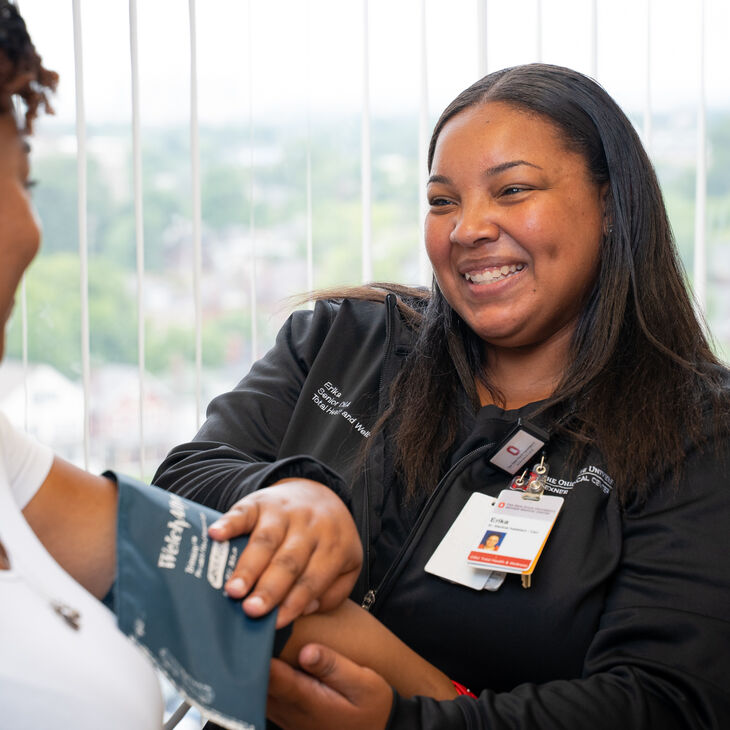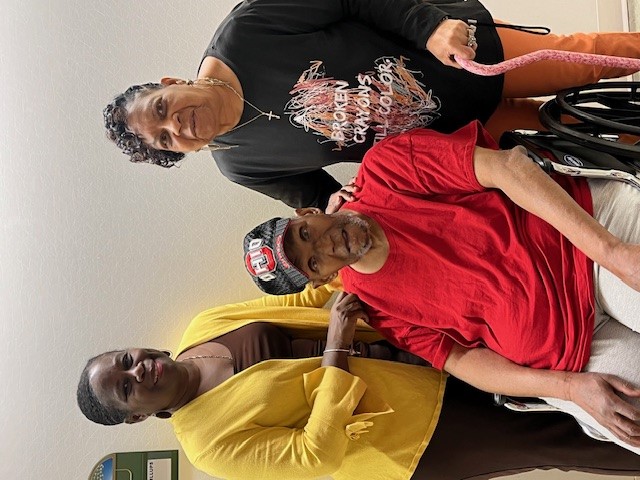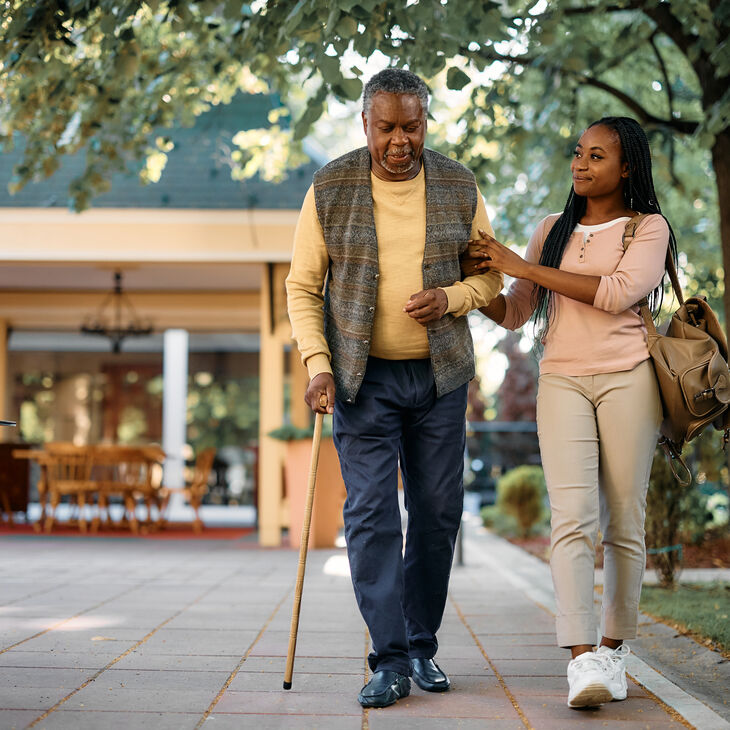This month’s Transformative Solutions in Healthcare piece features the full text of an interview with Arlene Bierman, MD, MS, director of the Center for Evidence of Practice Improvement and the federal Agency for Healthcare Research and Quality (AHRQ). The interview was conducted on March 28, 2022 by Bernadette Melnyk, PhD, APRN-CNP, FAANP, FNAP, FAAN, vice president for health promotion, university chief wellness officer and dean of the College of Nursing.
Bern Melnyk:
I am thrilled to have with me today, a very special distinguished person who I had the pleasure of getting to know a few years ago, Dr. Arlene Bierman. She is a wonderful internal medicine specialist, geriatrician, and very important in her role as director of the center for evidence of practice improvement at the Agency for Healthcare Research and Quality (AHRQ). So, Arlene, thank you for joining me today for our Transformative Solutions in Healthcare. I'm going to start by asking you a first question and that is, as we emerge slowly from the COVID-19 pandemic and look optimistically at the post-pandemic world, what are your center's core priority areas?
Arlene Bierman:
Oh, first of all, thank you for that generous introduction. And I'm not sure we're going to be getting to the post-pandemic world that quickly, because we're going to have a lot of people living with the post-acute sequelae of COVID. And unfortunately we don't know how long that's going to last, but I do think we're going to be emerging from the acute crisis eventually. And I think that the COVID-19 crisis really spotlighted a lot of the shortcomings of our health system. And I think it gives us an opportunity to really intervene and improve things. And I think particularly we knew who was most vulnerable, people with chronic disease, much of it preventable. We saw the disparities and we saw where our health system just frankly didn't work as well as it should have. So I think it really highlighted, I think the importance of a lot of the work that AHRQ does to really improve the health system, to get evidence to the point of care and ultimately goal of optimizing the health of individuals and their communities and families.
Bern Melnyk: Absolutely. So, Arlene, I've got a philosophy that I've long had because evidence-based practice, it's one of my deepest passions, but I always say, "In God we trust, but everybody else should bring data to the table." And that's what I so appreciate about AHRQ really and what you are doing with your center. What do you think people's needs are right now, given the state of where we're at, coming hopefully slowly, coming out of COVID, but experience the adverse outcomes that'll follow for quite some time?
Arlene Bierman: Yeah. What a great question. So I think first of all, some of the innovations we did during COVID, you had a new infection, it was affecting so many different people and we didn't know much about it. And we're very involved in doing evidence reviews, synthesizing all the evidence and really it was an opportunity for us to learn how to do living reviews. How do you keep evidence current? How do you link evidence to clinical decision support? So I think a lot of the advances that we did during the pandemic are really going to inform our work going forward. I really do think we learned that most of the people admitted who had serious illness from COVID had multiple chronic conditions, and sort of the need for patient-centered care. How do we reduce risk in people who are high risk and how do we really develop care plans to optimize their health that takes into account all of their conditions, as well as their social context which we know now is really important? I think also we need new models of care.
We realize that primary care could have done a lot more during the pandemic and wasn't tapped to the extent that it could have. But how do we fully integrate primary care into both the bigger health system, as well as public health and communities and how do we make transitions between these sectors seamless? And I think the other thing is that we need two kinds of evidence. We need the clinical evidence, right, and we also need the evidence for how do we organize and deliver care and how do we implement the evidence? So I think our center is working on all of those.
Bern Melnyk: We have this saying, we've had it for almost two decades. It takes about 17 years to translate findings from practice into real world clinical settings to improve, really see the improvements in practice. What do you see that we can do more to help with this more rapid translation of our evidence into clinical practice?
Arlene Bierman: Oh, that's critical. And something that we're working on in a couple of ways. So like I said, we're working on doing these living reviews that stay current with the evidence. We're looking at clinical decision support for both patient-facing and clinician-facing to help people make decisions, to do shared decision making and to make the evidence accessible. How do we make it easy for people to get the evidence they need at the point of care and understand how to use it? And then the other part is we need to know how to implement. So what AHRQ is doing, we have a large dissemination and implementation portfolio, is really integrating quality improvement with implementation science. So we could continue learning, how do we implement better? How do we make sure people are getting... How do we prioritize? What are the interventions that people need and then develop the strategies to accelerate the uptake?
Bern Melnyk: That is so key. So our Fuld National Institute for Evidence-based Practice at Ohio State, we are working with hospitals, healthcare systems all throughout the United States and globe on how to speed that translation of evidence into practice. I would like to say we have made so much progress in this area because we've been beating this drum for so many years, but barriers still exist in so many places that still make it character building for this to happen. And I think you made such a fabulous point when you said Arlene, we've got to make it easy for people because we get bombarded during the course of the day with so much information that it's tough for the practicing person, especially at the bedside to really synthesize and gather this all and then take action. What I love about what your center is doing is you are making it easier for this translation to happen. And I want to throw you a dose of vitamin G for gratitude for doing that for sure.
Arlene Bierman: Yeah. And I think it's also we need to do the research and development differently. We're very interested in partnership research and user-centered design so that we need to make sure that the people on the front line are involved in developing the solutions that will work for them. And we also need to focus on workflow. How do we develop workflows that make sense and make it again, I'm just repeating myself, but easy for people to do the right thing.
Bern Melnyk: Absolutely. We have seen such an uptick in clinician burnout, depression, suicide, we've always had this epidemic going on, but now I've always said we have a mental health pandemic inside of the COVID-19 pandemic. What is your perspective on clinician burnout, mental health right now? Is your center focused at all on that side of things?
Arlene Bierman: Yeah. So you know that AHRQ has funded a lot of the foundational work on clinician burnout. And you also know the quadruple aim includes physician and clinician wellness. And now it's been expanded to the quintuple aim, which is adding in equity. We are absolutely interested in burnout. There was a really interesting paper that came out of our EvidenceNow portfolio that was in Health Affairs, I think in the late fall, by Sam Edwards, where he identified Zero-Burnout Primary Care Practices and what it is, it's the culture, it's how you structure care. So I think there's two ways of dealing with burnout. One is on the individual level and giving people tools for stress management and dealing with trauma. And I'm not going to say that that's not important, but it's necessary, but not sufficient.
And we really need to design workplaces to minimize burnout and we need to appreciate and value the work that people do. And we need to create supportive teams. So we really need as part of all of our improvement interventions really need to focus on the impact on clinicians, and how can they support them to do their job in a way that doesn't burn them out.
Bern Melnyk: Again, you hit on some really key points. At Ohio State we've always said that culture eats strategy for breakfast, lunch and dinner. We focus very heavily on culture here. We've got a menu of evidence-based options for folks to engage in terms of programming. But the other thing I always tell C-suites across the country, you got to fix system issues because if you've got serious system issues, you cannot offer all the evidence-based programming that you want. And it's probably not going to help all that much until you fix these system issues and culture issues. Arlene, what else would you like to share about your AHRQ center and its work at this point? Final, last thoughts and words from you?
Arlene Bierman: Yeah, I think I've highlighted it a little bit, but our dissemination and implementation portfolio, and that's where we take evidence and we really try to understand how to get it into practice. And so we have a whole suite of initiatives. We did EvidenceNow which focused on reducing cardiovascular risk reduction in response to that, we are working with four states in the highest quartile of bad cardiovascular outcomes on hypertension control and smoking cessation. But really working with them. How do they partner with public health? How do they partner with their state health departments? How do we bring everybody to the table to align efforts as well as how do we reach those where the disparities are? Who have the worst outcome? So how do we address health equity as we improve care?
We have another one, you talked about how the COVID, the impact on health professionals. The impact on the population, alcohol is another pandemic right now. So we have another initiative on how do we address screening and you were on the task force, you know this, brief intervention screening and referral for unhealthy drinking and primary care. And we just started another one, which we're very excited about on urinary incontinence in women, because it's a common disease. I call it the Don't Ask, Don't Tell disease. Patients don't want to admit they have it. They're embarrassed. A lot of clinicians don't have the skills to manage it. So they don't want to know about it. They're busy dealing with the diabetes, hypertension are arthritis. Let's forget about that. So really how do we make it easy again for primary care practices to be able to identify screen and treat people with urinary incontinence. And that means partnership with the community, with health educators about behavioral interventions.
It means having collaborative and step care so if you don't feel like, if it didn't work you're stuck, you know who to send them to. So in all of these dissemination and implementation initiatives, it's really learning how to accelerate the uptake of evidence in practice.
Bern Melnyk: Well, I want to thank you for your fantastic leadership, your center, all of its fantastic work. We really appreciate it and know that we look to your center to help us implement best evidence and practice to improve outcomes. Thanks so much for being with me today. Much appreciated.
Arlene Bierman: Oh, thank you. Thank you for inviting me. It's been wonderful.




